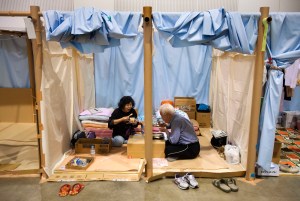
A Japanese couple eat their dinner on May 26, 2011 at a shelter in Fukushima prefecture after being evacuated from the nuclear exclusion zone. (AP Photo/David Guttenfelder)
Tokyo Electric Power Company’s stock rose 25% after Japan’s cabinet announced it approved a plan to help the nation’s largest utility avoid bankruptcy and pay a huge compensation bill to victims of the Fukushima Daiichi nuclear power plant crippled in the March 11 tsunami.
For the last three months, the future of TEPCO, which operates the plant, has been anything but clear. The company has already announced annual losses of $15 billion for the last fiscal year — the largest of any non-financial company in Japan — and it could eventually have to pay out up to $125 billion to the tens of thousands of people displaced by the nuclear disaster as well as to several unions whose livelihoods have been affected.
The bailout plan, which still has to be approved by parliament, would be managed by a government body, fed both by annual contributions from other nuclear power operators and public money. TEPCO would eventually have to pay back all the money it used from the fund.
Trade Minister Banri Kaieda said the cabinet would try to move the plan through parliament “as early as possible,” but a move to save the company that has become a symbol of mismanagement in this historical nuclear crisis is likely to run into a few walls in Japan’s deeply divided government. The firm has come under intense criticism for its handling of the nuclear crisis, with everything from the safety conditions of its workers to its transparency in communicating the gravity of the situation to the government in the early days of the disaster under scrutiny. As of Monday, at least eight of nearly 4000 workers have been exposed to radiation levels over the emergency limit of 250 millisieverts that the government set for workers at the plant. That number is expected to climb.
The Liberal Democrats, Japan’s main opposition group, has not yet come out in favor of the bill. LDP Secretary General Nobuteru Ishihara was quoted in the Wall Street Journal as saying, “It’s a problematic scheme that demands payments from other power companies that aren’t at fault, and holds [Tepco] accountable for limitless compensation.”
Even if it survives financially, TEPCO isn’t likely to recover its reputation among Japanese households anytime soon. Not only has it presided over one of the world’s worst industrial disasters, it may be about to reach further into customers’ pockets. On June 13, the Mainichi Daily News reported that TEPCO is considering a 16% increase in electricity rates in fiscal year 2012 to cover its expenses. The Japanese daily reports:
“TEPCO is projected to cover the expected rise in fuel costs [due to a shift from nuclear to thermal power] by raising the electricity rate by about 16 percent, or 1,000 yen a month for an average household, in the spring of 2012, which will boost revenue from electricity fees from about 4.6 trillion yen in March 2012 to about 5.8 trillion yen in March 2015.”


